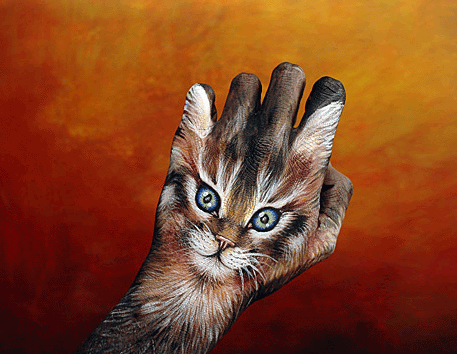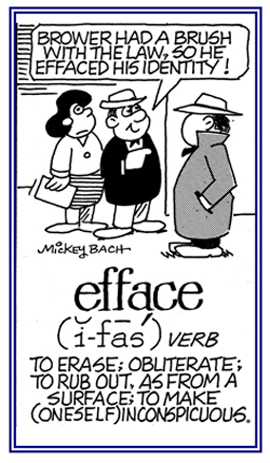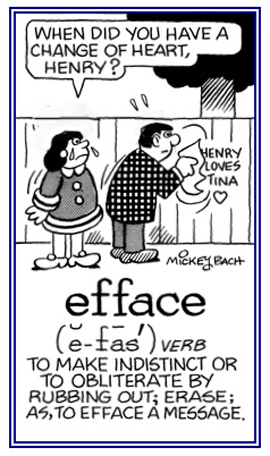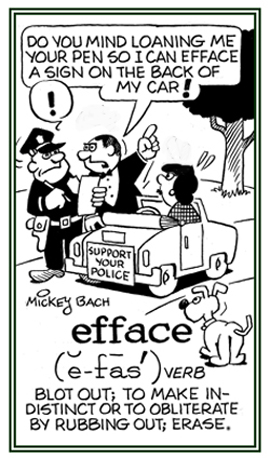facio-, faci-, face-
(Latin: face, pertaining to the face; countenance; form, make, set in place, do)
about-face (verb), about-faces; about-facing; about-faced
1. To turn to the opposite direction, opinion, etc; to reverse oneself.
2. To move in a contrary direction.
3. To backtrack, to change, to flip-flop, to switch, to take an opinion in reverse.
2. To move in a contrary direction.
3. To backtrack, to change, to flip-flop, to switch, to take an opinion in reverse.
acousticofacial (adjective), more acousticofacial, most acousticofacial
Relating to both the eighth (auditory) and seventh (facial) cranial nerves: As a result of an automobile accident, Herbert suffered severe acousticofacial damage on the lower right side of his head, which affected both his hearing and facial functions.
1. The act of pivoting to see in the opposite direction from the original position; especially, in a military formation or a military command to turn clockwise 180°.
2. A total change of attitude or viewpoint or a complete change in the way a person behaves or thinks about something.
3. An abrupt, complete change in opinion, beliefs, actions, etc.; a sudden reversal.
2. A total change of attitude or viewpoint or a complete change in the way a person behaves or thinks about something.
3. An abrupt, complete change in opinion, beliefs, actions, etc.; a sudden reversal.
brachiofacial (adjective), more brachiofacial, most brachiofacial
Pertaining to the arm and the face.
brachiofaciolingual (adjective), more brachiofaciolingual, most brachiofaciolingual
Relating to or affecting the arm, face, and tongue.
buccofacial (adjective) (not comparable)
A reference to the outer surface of the cheek or a combination of the side of the face and the mouth of a person's head. Before Lynn's tooth was extracted, the dentist injected an anaesthetic which caused the buccofacial area around her mouth to be quite swollen!
cat's face (s) (noun)

An artistic painting on the hand by Italian artist Guido Daniele.
cervicofacial (adjective) (not comparable)l
Relating to the neck and the face: Grace had cervicofacial injuries after falling off her bike, and her face and neck were bleeding.
deface (verb), defaces; defaced; defacing
1. To harm the surface or appearance of something; for example, by drawing or writing on it: The youngman was caught defacing his father's books.
2. To mar or to disfigure: The canyon's spectacular limestone walls have been defaced by the flood waters in the lake that were caused of the severe storm.
2. To mar or to disfigure: The canyon's spectacular limestone walls have been defaced by the flood waters in the lake that were caused of the severe storm.
The teenagers were caught defacing or vandalizing a school building with spray paint.
dentofacial (adjective), more dentofacial, most dentofacial
A focus on dental displacement and the control and modification of facial growth: Usually, dentofacial is better defined as "dentofacial orthopedics" which involves severe malocclusions that can be a part of craniofacial abnormality or disorders which primarily affect the cranium (head) and the facial bones.
efface (verb), effaces; effaced; effacing
1. To remove, to blur, or to completely eliminate from recognition or recollection: Cornelia wanted to efface the memory of the time she slipped on the icy sidewalk in front of her house and broke her wrist.

© ALL rights are reserved.

© ALL rights are reserved.

© ALL rights are reserved.
Go to this Word A Day Revisited Index
Bruno and Colby used brushes and spray paint to efface the words that someone had painted on the walls of their house.
2. To respond in a humble way because of shyness or modesty: Flossie was advised to accept the teacher's compliments regarding her report and not to efface herself by saying she could have done better if she had tried harder.


Go to this Word A Day Revisited Index
so you can see more of Mickey Bach's cartoons.
1. When a person withdraws into the background and makes himself or herself inconspicuous.
2. The shortening or thinning of a tissue in the body.
2. The shortening or thinning of a tissue in the body.
1. The front part of a person's head that has the eyes, nose, and the mouth from the forehead down to the chin: The face shows emotions; such as, sadness or there are happy faces.
2. The way a situation is seen or thought of by people: If she wins the election, it will change the face of American politics.
3. The surface of something; especially, one that is presented to be seen or which has a particular function:
2. The way a situation is seen or thought of by people: If she wins the election, it will change the face of American politics.
3. The surface of something; especially, one that is presented to be seen or which has a particular function:
- Each of the surfaces of a solid; such as, the faces of a cube with six square faces.
- The face of a vertical or sloping side of a mountain or a cliff.
- The front or the face of a building.
- The face of a clock or watch shows what time it is.
- The sides of a coin showing the head or principal design and the back; such as, when the coin is flipped, it will land on its "heads" or "tails" face.
- The face or side of a planet or moon that is seen by an observer.
face (verb), faces; faced; facing
1. To sit or to stand with the body turned toward someone or something: The speaker faced her political opponent and made comments about his behavior.
2. To deal with something that is unpleasant or bad in a direct manner: Jim will have to face the consequence of his decision to quit his job.
3. To admit that a situation is true or real: The people in the area must face the possibility that the hurricane will cause a great deal of destruction and so they have been told to move to safer places.
4. To meet others in a competition: Bob was a pitcher who struck out the first four batters that he faced in the baseball game.
2. To deal with something that is unpleasant or bad in a direct manner: Jim will have to face the consequence of his decision to quit his job.
3. To admit that a situation is true or real: The people in the area must face the possibility that the hurricane will cause a great deal of destruction and so they have been told to move to safer places.
4. To meet others in a competition: Bob was a pitcher who struck out the first four batters that he faced in the baseball game.

